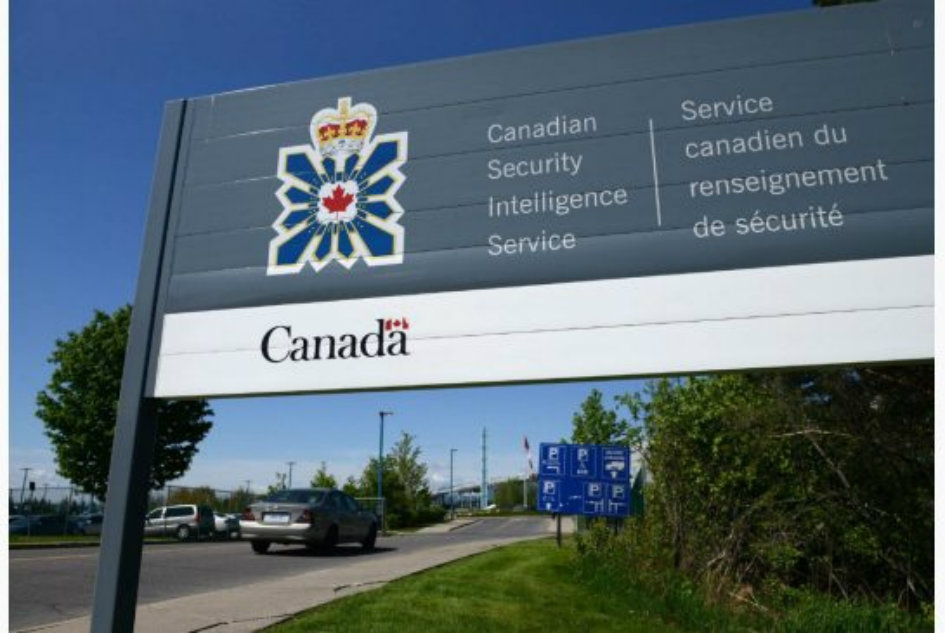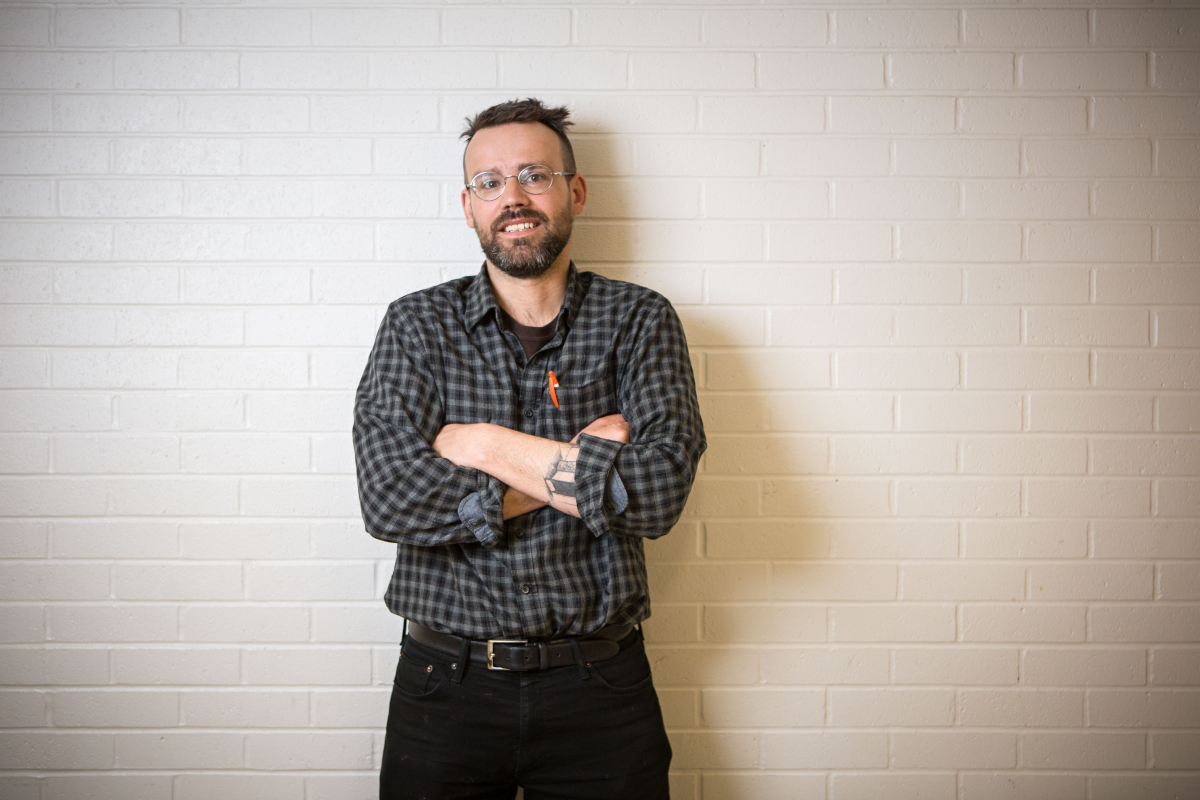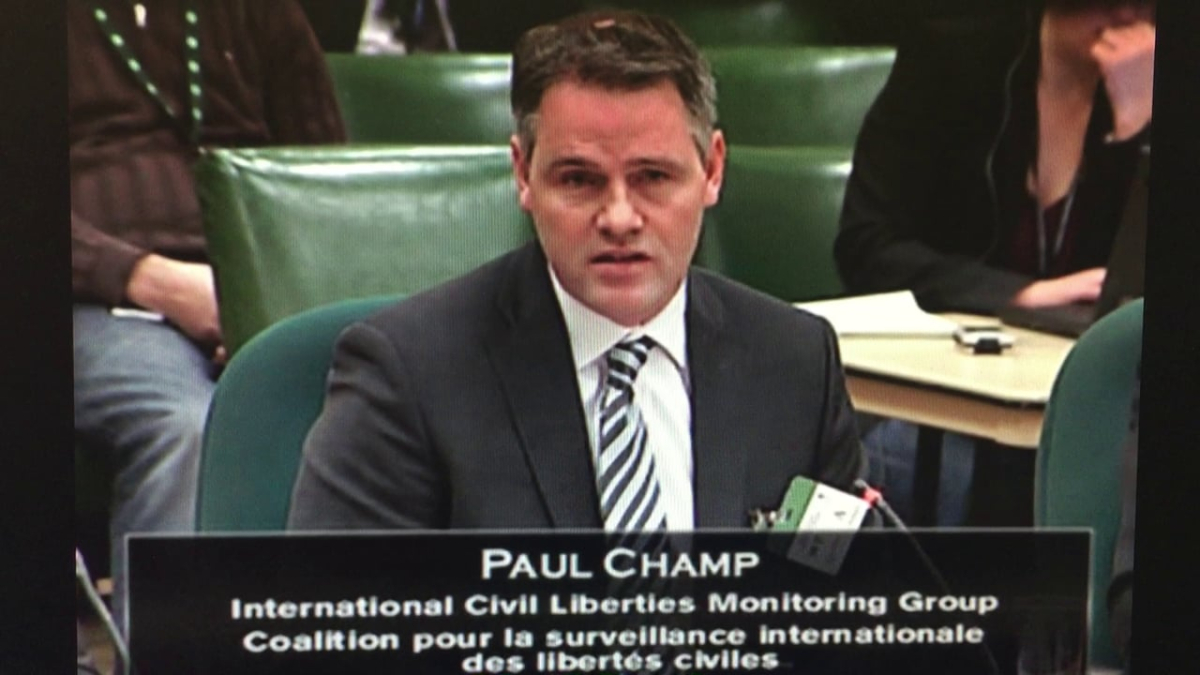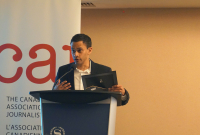Support strong Canadian climate journalism for 2025
In the fall of 2013, Jason Augustine was in the thick of one of the most important standoffs First Nations activists have ever had with energy companies.
As a district war chief with the Mi'kmaq Warriors Society, and a member of the Elsipogtog First Nation near Rexton, a village on the east coast of New Brunswick, Augustine and his band were engaged in a protest against fracking. For weeks he and his fellow activists blocked the entrance to a compound where a fracking company had stored equipment, among other protests. Augustine notes that they did this because with fracking, "the gas (that is released) contaminates drinking water."
In October of that year, RCMP officers, with guns drawn and dispatching pepper spray, descended on the blockade, arresting 40 protesters, Augustine among them. Five RCMP vehicles were set on fire during this final confrontation. Augustine was later sentenced to 18 months of probation, and pled guilty to assaulting a police officer, two counts of obstructing a police officer, and one count of mischief. This standoff, however, galvanized attention to the issue of fracking and the province soon placed a moratorium on it.

Yet Augustine's problems with the RCMP have continued: the 42-year-old is frequently followed by what Augustine believes are government vehicles. “And it’s just not me that’s been followed,” he remarks. “A lot of our Warriors Society members get followed. It’s just going to a different reserve and they still get followed. They are always monitoring us and trying to figure out what we are doing.”
“I see it as harassment,” he continues. “Why can’t we live our lives without being watched? We stood up for our water and our land, you know. We did that, and under our treaties we have the right to do that.”
As discussed in Part One of our two-part series, the federal government has created a massive and sophisticated spying apparatus – overseen primarily by the RCMP and the Canadian Security Intelligence Service (CSIS) – designed to track the actions of First Nations and environmental activists opposed to so-called "critical infrastructure" projects, namely the tar sands, pipelines, fracking and mining. But critics of this network say it does more than just spy on people – it tries to intimidate too. More importantly, the fruits of all of this espionage are often shared with the energy sector.
As an example of intimidation, in May of 2012, the Yinka Dene Alliance in BC decided to take a “Freedom Train” across Canada to Toronto, bringing attention to Enbridge’s proposed Northern Gateway pipeline, which was slated to connect the oilsands to the BC coast (last year, the Trudeau government canceled the pipeline after former PM Harper had approved it). The Alliance planned to arrive in Toronto in time for Enbridge’s annual shareholders’ meeting. Among the 37 band members who left BC on the train was John Ridsdale, the Hereditary Chief of the Na'Moks, Tsayu Clan, Wet'suwet'en, who lives in Smithers, BC.
On the train with them, recalls Ridsdale, were undercover officers, presumably RCMP or CSIS, or both. “When you have people going up and down an aisle of a train – you know you are being watched,” he says. “They were easy to pick out. They were not really trying to be undercover – they wanted us to know we were being watched.” The trip went off without incident, culminating in a rally and march in downtown Toronto.
Ridsdale says that First Nations people protesting resource development “take it for granted we are all monitored… (but) we are nonviolent and we are here to protect the land and water and freedom. We are not against development – we are against the manner (in which) they do it.”
In response to questions furnished by the National Observer, the RCMP said as part of its mandate "the RCMP does have the requirement to identify and investigate criminal threats, including those to critical infrastructure." They also noted "the RCMP has instituted a measured approach to large-scale public order events."

Idle No More panics the intelligence bureaucracy
Yet the culmination of this type of espionage and intimidation occurred after the birth of Idle No More. Founded in late 2012 by four Saskatchewan women in response to Harper’s omnibus bills that gutted laws designed to protect the environment over resource development projects, Idle No More led to teach-ins, blockades, protests and rallies as well as a National Day of Action. It even sparked solidarity protests in other countries.
Yet Idle No More caused panic within the federal government’s intelligence and surveillance bureaucracy, which swung into action. “Idle No More was, as far as I know, the most completely surveilled social movement in Canadian history,” says Carleton University criminologist Jeffrey Monaghan, who has studied this issue. “Every single event had intelligence gathering about it. Whether it’s open source or more covert methods. We’re talking about very remote events in like Prince Albert, Saskatchewan to the more contentious ones, like Sarnia. Every single event was being scrutinized, was being monitored and was being cataloged."

“On top of that, you had formations of national security working groups at the highest level of the bureaucracy having regular updates and streaming information directly to the prime minister and national security adviser and cabinet in real time.”
Indeed, a heavily-redacted 11-page report obtained by the National Post in 2014 shows that CSIS was involved in preparing an all-of-government approach to dealing with the First Nations protests. The report, and a PowerPoint presentation, revealed that Ottawa was planning for every eventuality, concerned by the decentralized, leaderless nature of Idle No More. Moreover, says Clayton Thomas-Muller, a former Idle No More organizer: "There were multiple reports of CSIS and RCMP agents contacting individuals at their homes and in public over participation in Idle No More. Any time an officer of the settler colonial state... approaches an Indigenous person, it is considered threatening, given the statistics around the criminalization of Indigenous peoples and our over-representation in Canada's jails."
Intelligence shared with energy sector
What happens to all of the information and data gathered about activists?
For one thing, some of it is shared with the energy sector. Starting in 2005, Natural Resources Canada, in collaboration with CSIS and the RCMP, began hosting twice-yearly classified briefings with executives from energy companies at CSIS’s headquarters in Ottawa - which continue to this day. “You have the RCMP and CSIS giving these briefings to the private sector – but the private sector wanting those briefings to be driven by the demands of those receiving the information,” says University of New Brunswick sociologist Tia Dafnos, who has researched this topic.

In 2012, Tim O’Neill, a senior criminal intelligence research specialist with the RCMP’s Critical Infrastructure Intelligence Team, wrote an email in which he said the purpose of these meetings “is to provide intelligence briefings to select energy representatives so they are able to implement the required security precautions to protect their assets. The briefings also provide a forum for the private sector to brief the Canadian intelligence and law enforcement community on issues we would not normally be privy to.” This email noted that the energy sector executives possess at least a “Level II (Secret) Security Clearance.” Indeed, Keith Stewart, head of Greenpeace Canada’s climate campaign, estimates “there are over 200 executives in the natural resources sector who have security clearance from CSIS and RCMP around these things like critical infrastructure.”
Agendas for these briefings, that have emerged through access to information requests, show that items of discussion include issues such as “security challenges presented by Radicalized Individual Groups to Canada’s Energy Sector” and “Extremist Activities within Aboriginal Communities”, and topics such as "Improvised Explosive Devices”, or on specific projects, such as the oilsands and Northern Gateway pipeline.
These briefings are well-attended, too. On the government side, they include people from the RCMP and all of Canada’s intelligence services, as well from the departments of Natural Resources, Defence, Public Safety, Transport, Industry Canada, National Energy Board (NEB), Atomic Energy Canada Ltd., the governments of New Brunswick, Quebec and Alberta, and the federal Office of the Auditor General, among others.
On the corporate side, however, it's unclear who attends. All federal documents have been censored prior to release under access to information legislation to remove the names of companies that send executives to the meetings.
Nonetheless, in 2013, minutes to one meeting reveal that networking and coffee receptions at the briefing was sponsored by the pipeline company, Enbridge Inc., along with the (US) $250-billion Toronto-based global conglomerate, Brookfield Asset Management Inc. (Enbridge did not respond to requests for a response while Brookfield says it has been a number of years since they have participated in the briefings, and did so only because they were concerned about cyber-security and loss prevention).
Meanwhile, Canadian Natural Resources Ltd., which operates the Horizon oilsands project in Fort McMurray, Alberta, was an invitee to the briefings, according to one RCMP email (the company refused to discuss its participation in these briefings when approached by National Observer). “This is how the energy companies have become part of the national security bureaucracy themselves,” observes Monaghan. “They are embedded within the bureaucracy because now, for the most part, 'critical infrastructure' is privately owned… It’s a two-way street: the police and CSIS have deputized the companies and their security actors to provide intelligence as well. This emerges from the energy companies putting pressure on the governments saying ‘You are not doing enough to stop these activists from disrupting whatever’.”

Astonishingly, it seems that some of the information collected has been passed on to the companies before it’s even seen by all divisions of the RCMP. In a 2010 email from O’Neill, he mentions that another RCMP officer “was very concerned that the private sector was receiving intell prior to the Detachments, which of course should not be the case as the Divisional CICI (Critical Infrastructure Criminal Intelligence) analysts should be disseminating our products within their Divisions.”
CSIS spokesperson Tahera Mufti does not deny the agency shares intelligence with other parties, saying in a statement to the National Observer: "The role of CSIS is to investigate activities suspected of constituting threats to the security of Canada, and to report on these to the Government of Canada. CSIS collects and analyzes threat-related information, which is typically disseminated to government partners through intelligence reports and other intelligence-related briefings."
In a response to question by National Observer on these briefings, the RCMP said that they, "through the National Critical infrastructure Team, assists in the identification of criminal threats to Canada's critical infrastructure and develops information products that may be used by first responders and the private sector to assess and mitigate risks associated to these threats."
National Energy Board (NEB) collects intelligence on activists
The intelligence gathered is also shared with the federal energy regulator, the National Energy Board (NEB), which is supposed to be a neutral tribunal over the approval and oversight of pipelines and other projects.
Yet documents released by the NEB show that its security staff have been alarmed about protesters showing up at hearings – and gathers intelligence on who they might be. To this end, CSIS and the RCMP provides the NEB with information. In 2013, the NEB’s head of security, wrote in an email that the Board’s security team had consulted with CSIS “at national and regional levels,” noting that they would continue monitoring all sources of information with police and intelligence partners.
Emails that have come to light through access to information requests show that the NEB security staff have been in constant contact with the RCMP's Critical Infrastructure Intelligence Team (CIIT) about potential protests at hearings, too.
In 2013, for instance, a member of the CIIT wrote to NEB staff and at least one CSIS official, Tom Lanzer, regarding the risk of interference with the Board’s hearings by groups opposed to oil sands and pipeline development. Despite acknowledging that CIIT had no intelligence indicating a criminal threat to the NEB or its members, the email advises that CIIT “will continue to monitor all aspects of the anti-petroleum industry movement” and said this information was also being shared with CSIS.
In response to a query from the National Observer, the NEB did not deny it monitors people who appear before the hearings. Sarah Kiley, a communications officer with the Board, said "we are required to continuously assess any potential security risks and take the appropriate steps to make sure that our staff, our Board Members and those attending our hearings, are safe and can freely participate in our hearings. Advice, guidance and other services provided by lead security agencies support federal agencies, such as the National Energy Board, in maintaining acceptable levels of security."
Is spying on peaceful protesters legal?
But is all of this espionage and sharing of data actually legal?
Paul Champ doesn’t think so. The Ottawa-based human rights lawyer is involved in two on-going complaints launched by British Columbia's civil liberties association against the RCMP and CSIS over their role in spying on peaceful protesters. Launched in 2014, Champ says the complaints have become "bogged down... These processes are ridiculously slow and unresponsive and obviously lack transparency" and he says there is no end in sight.
Champ argues that the Mounties and CSIS have no legal grounds to spy on people who are opposed to projects that don’t even exist – which is true for most of the pipelines being discussed.
“It’s one thing if it's a pipeline that’s already been built and people are protesting that, than maybe, theoretically, there’s a threat to that critical infrastructure,” says Champ, “but here these environmental and Indigenous groups are opposed to the policy of a pipeline. And a policy, in my mind, cannot be viewed as an aspect of national security. Therefore the jurisdiction of national security by CSIS cannot be engaged.”

Champ notes that in order to justify this surveillance, “there is a legal threshold that must be crossed before an individual or group can be actively investigated... We think they need some kind of grounds to suspect, in the case of the RCMP, that someone has committed a criminal offense, is about to commit a criminal offense or, in the case of CSIS, that a group is, or might be, a threat to national security as defined by the act. We have a set of legal thresholds and until they are met CSIS and RCMP should not be getting themselves involved in gathering information about groups that are otherwise lawfully exercising their democratic rights.”
Champ also notes that “there’s no authority to be a sharing their intelligence reports with third parties such as corporations. Or the NEB, for that matter. Sharing information in that way is outside their jurisdiction and the CSIS Act and is a breach of (people’s) Charter rights.”
Has this espionage under the Trudeau government continued? In fact, evidence suggests nothing has changed. After all, Trudeau has approved or supports the Kinder Morgan, Keystone XL and Energy East pipelines, and greenlit a $11.4-billion liquefied natural-gas (LNG) mega-project in British Columbia. And the twice-yearly briefings held at CSIS's headquarters with the energy sector continue.
“The bottom line is that Canada’s entire economic paradigm is fundamentally based on the oppression of Indigenous people’s collective rights, the dispossession of Indigenous peoples from their lands to provide open-door access to extractive companies to get resources to international markets to sell to the highest bidder,” says tar sands campaigner and Manitoba Cree, Clayton Thomas-Muller, who has been the target of RCMP surveillance himself. “When we look at all of the pipelines and all of the oilsands and all of the mining and all of the mega-hydro dams and the places where Canada’s most toxic and destructive industries are placed, it's in the backyards of First Nations peoples. So it’s a very big issue.”
Indeed, shortly after the Kinder Morgan and Enbridge Line 3 pipelines were approved by the Trudeau government late last year, Natural Resources Minister Jim Carr gave a speech to a group of business leaders in Edmonton, where he assured them: “If people choose for their own reasons not to be peaceful, then the government of Canada, through its defence forces, through its police forces, will ensure that (your) people will be kept safe.”
A few days later, Carr said he regretted his remarks and apologized.






Comments
Note that the $11.4-billion liquefied natural-gas (LNG) mega-project greenlit by Trudeau is not slated for Richmond, BC. The announcement of the approval of Pacific NorthWest LNG was made in Richmond. http://vancouversun.com/news/local-news/feds-flying-to-vancouver-for-hi…
Imagine if the RCMP and CSIS spent all that effort spying on the energy companies instead, because of their extensive money laundering, tax evasion, and efforts to subvert the Canadian democratic process with propaganda and lobbying.
These are all far more serious than anything they're accusing First Nations activists of, and yet can any of us imagine it happening? Of course not. Makes it clear that the supposed law and order concerns are an excuse--fundamentally, they're working for the rich and against the rest of us who might want to resist being victimized by the rich; the law or the interests of the country have nothing to do with it.
I guess the phrase "a law for the rich and a law for the poor" should be revised to " the law for the rich but no law for the poor".